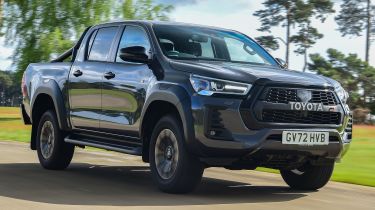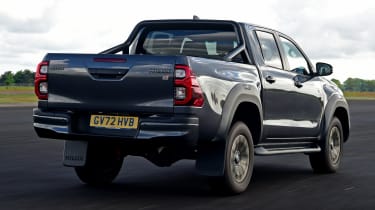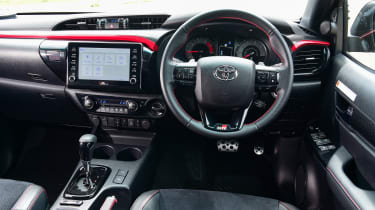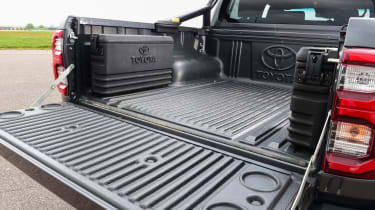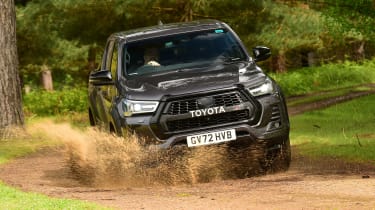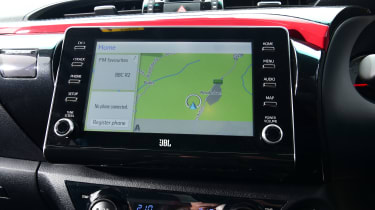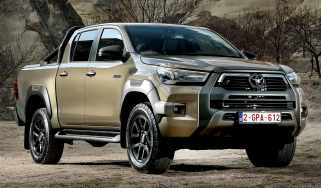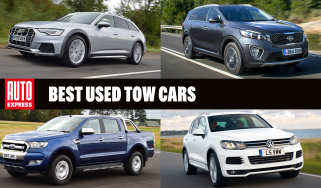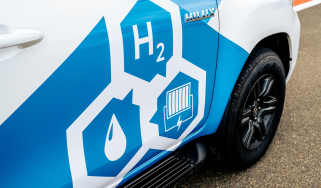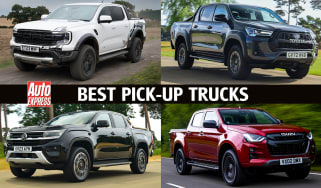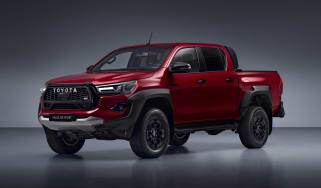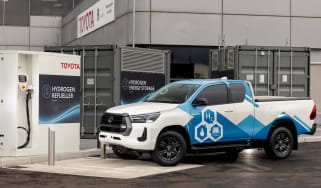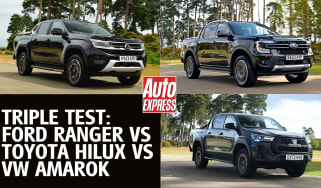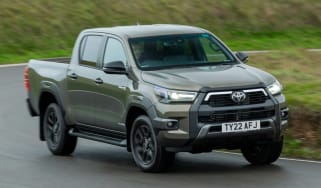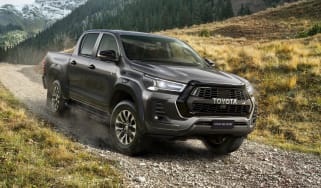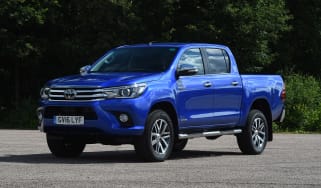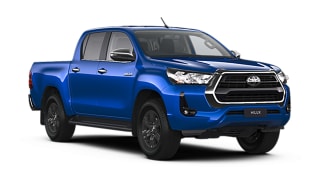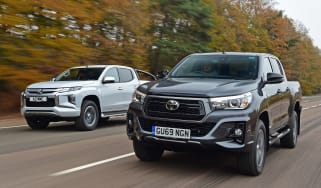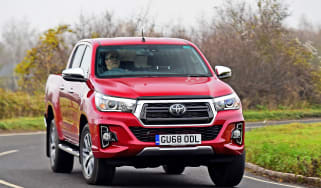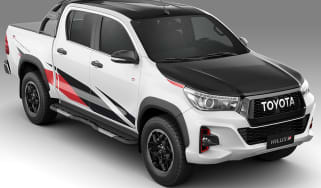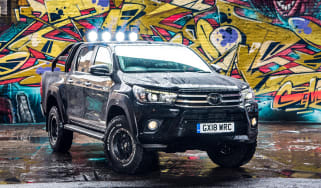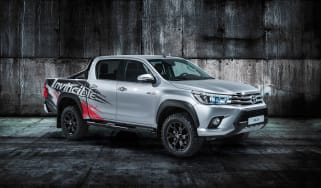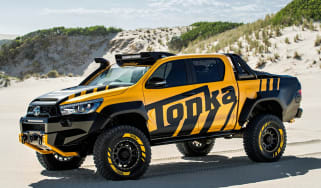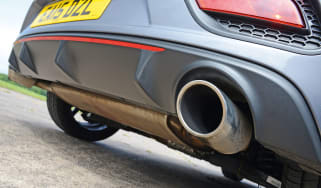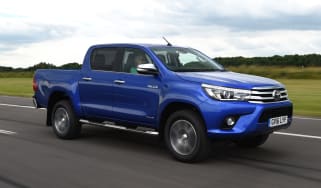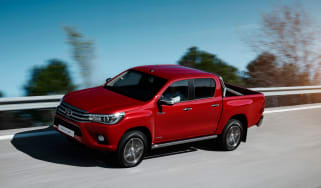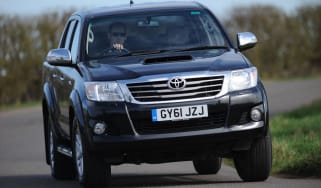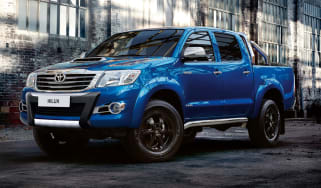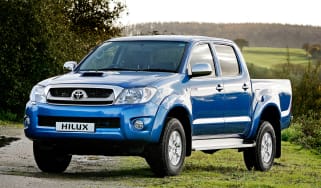Toyota Hilux pick-up review
The Toyota Hilux is famous for its ruggedness, and despite its age remains a front-runner in the pick-up truck class

The Toyota Hilux is one of the most famous names in the pick-up world, and it’s earned this fame for being tough and reliable even in the harshest conditions on Earth. No wonder that more than 18 million have been sold globally, but this latest version is our favourite and one of the best pick-up tricks around thanks to its legendary reliability, rugged build and spacious load bay.
The Double Cab version is the most appealing, because it brings the option to use it for work and family life at the same time. However, the Hilux doesn’t feel as sophisticated or upmarket as the latest Volkswagen Amarok or Ford Ranger, especially inside.
About the Toyota Hilux
When it comes to the rough and tumble of working life, few machines are as dependable and durable as the iconic Toyota Hilux. The first-ever Hilux rolled off the production line in 1968, while the current eighth generation model arrived in 2015. Since then, the Hilux has received regular facelifts, updates and tweaks in order to keep it in fighting form as the pick-up segment has thinned to just a handful of models.
The Hilux’s closest rival is also our favourite pick-up truck, the Ford Ranger, winner of our Pick-up of the Year award six years running now. Like the Ranger, the Hilux is available in a variety of bodystyles and trim levels.
Used - available now

2019 Kia
Venga
26,580 milesManualPetrol1.6L
Cash £9,495
2021 Ford
Focus
21,569 milesManualPetrol1.0L
Cash £14,495
2023 Citroen
C5 Aircross
13,712 milesManualPetrol1.2L
Cash £19,950
2021 Peugeot
108
8,303 milesManualPetrol1.0L
Cash £9,290The Volkswagen Amarok is the other model with a large share of the UK pick-up market. The latest model was developed in conjunction with the Ranger, but it’s only available in four-door Double Cab form and is more expensive to buy, although it’s also more upmarket than the Toyota and Ford.
The only pick-up trucks on sale in the UK now are the Isuzu D-Max, SsangYong Musso and all-electric Maxus T90EV. The Nissan Navara, Mercedes X-Class and Mitsubishi L200 are all gone, but you can easily find yourself a secondhand example of any of them.
Kicking off the Hilux range are the two-door Single Cab and Extra Cab (extended) versions, which are aimed at those looking for a work vehicle only. Both models are available exclusively in the most basic Active trim, and come equipped with a radio, CD player, Bluetooth, 17-inch steel wheels, manual air conditioning, power windows and Toyota’s Safety Sense 2 which bundles lane departure alert and adaptive cruise control, among other safety systems.
In Double Cab form, the Toyota is available in Active, Icon, Invincible, Invincible X and GR Sport trims. Before you get your hopes up however, the GR Sport is not a high-performance Hilux raring to take on the Ranger Raptor, it just gets different suspension, a JBL sound system, sports seats and 17-inch alloy wheels. There’s also a Toyota Hilux Arctic Trucks AT35 version built for proper off-roading, with chassis, suspension, wheel and tyre upgrades that costs more than £61,000 (excluding VAT).
The mid-range Invincible trim is our pick as it comes well-equipped with an eight-inch touchscreen, Apple CarPlay, Android Auto, LED lights all round, dual-zone air-con, heated front seats, front and rear parking sensors, plus a reversing camera.
Depending on which model you pick, there are two engines available in the Hilux range. There’s a 148bhp 2.4-litre four-cylinder diesel and a larger 2.8-litre four-cylinder with 201bhp, with Invincible being the only trim level offered with both engines. Active and Icon-spec trucks are only available with the 2.4, while Invincible X and GR Sport get the larger motor.
Again, depending on the model, you can choose either a six-speed manual or a six-speed automatic gearbox. All trucks feature selectable four-wheel drive, with 2WD, 4WD and low-range settings, plus a locking rear diff.
MPG, CO2 and Running Costs
Toyota might have brought hybrid technology to the masses with the Prius hatchback, but the Hilux continues to run on good old-fashioned diesel power so fuel economy is decent, rather than extraordinary.
Fuel economy across the range is also separated by only fine margins, with WLTP tests showing the 2.4-litre engine is able to return up to 32.8mpg when paired with a manual gearbox, dropping to 30.7mpg with the automatic. The larger 2.8-litre is capable of 33.2mpg at best with a manual or 30.7mpg with an auto.
We managed to achieve an average of 30.2mpg from the 2.8 Hilux we used for our group test between the Toyota, Ford Ranger and Volkswagen Amarok. In fact, the Hilux proved to be the most efficient of the bunch during our testing, but only just. Either way, at that rate and with the 80-litre fuel tank filled to the brim, the Hilux would be able to cover 531 miles before you need to make another trip to the pumps.
CO2 emissions for the 2.4-litre Hilux are rated from 223-269g/km, while the 2.8-litre model emits 223-248g/km.
The Hilux used to come with a five-year/100,000-mile warranty, but now you only get three years of coverage as standard. That’s because Toyota now adds an additional 12 months/10,000 miles of warranty cover with every service at an approved Toyota franchise, up to 10 years/100,000 miles total cover. Toyota’s accessories for the Hilux also come with a 12-month warranty.
Generous safety kit, including Toyota’s Pre-Collision System and Lane Departure Alert that’s standard on all models, should help to keep insurance premiums low.
Depreciation-wise, given the Toyota badge always carries serious credibility on the used market and the Hilux is a popular model, we expect the Hilux to hold its value as well as (if not better than) rivals.
Load Space and Practicality
As a pick-up truck is a commercial vehicle, the Hilux’s most important trait is how much it can carry and pull. Toyota is fully aware of this, which is why the current model has the biggest load bay and highest towing capacity yet.
The Hilux’s load bed measures 1,525mm long in the Double Cab model and 2,315mm in the Single Cab. That’s pretty much on a par with rivals, but it’s width where the Hilux has made great strides. The load area on all models is a full 130mm wider than before, so if you’re often loading up wide items, it may be the best choice for you.
The Single Cab gets the usual format of two seats, whereas the extra-cab uses two tiny rear-hinged suicide doors that open up to reveal a pair of cinema-style folding seats. They won’t be the most comfortable to sit on, however, and are only designed for occasional use.
Those worried about leaving items in the load bay unsecured should look at the range of load cover options, including a hard-top. Toyota also offers cross bars to sit on top of the bed or cab, as well as liners and utility boxes for the load bed.
If you plan on carrying passengers regularly, you’ll want the Double Cab, which is also the only bodystyle available in multiple trim levels. There are reasonable amounts of head and legroom in the back for two larger adults (or three at a push), and it’s roughly on a par with rivals in that area. There are no mod cons like air vents or charging sockets however, which can be found in the back of both the Ranger and Amarok. There are two sets of ISOFIX mounting points if you need to install a child seat.
Whichever variant you choose, the Hilux has a payload of at least 1,000kg, while the Active Single and Double Cabs sees that rise to 1,030kg. Every Hilux can pull up to 3,500kg braked (or 750kg unbraked), same as the Ranger.
Reliability and safety
Reputation isn’t everything, but Toyota has been known as a maker of very durable products, and the Hilux in particular has always been an extremely tough and reliable vehicle.
The rugged box frame chassis and selectable 4x4 system underneath is a proven set-up, although the diesel engines in the Hilux have only been around since 2015. The engines use some advanced new tech to boost efficiency and performance, but we’d be surprised if they didn’t turn out to be as reliable long-term as the old-tech diesel units.
Safety is another area that’s seen significant improvements. Every Hilux features seven airbags, including curtain airbags and one for the driver’s knee, while all but the most basic Active-spec models receive seatbelt pretensioners.
It’s not just the things you can see, though, because under the skin every Hilux has a wide array of safety systems installed. Every model gets ABS, Emergency Brake Assist, Vehicle Stability Control, Hill Start Assist and Trailer Sway Control, while Double Cabs also include Downhill Assist Control. Toyota’s Safety Sense package also makes its way across from the passenger car range, and includes autonomous emergency braking with pedestrian detection, lane-departure assist and (on certain models) road sign recognition. It’s a level of tech that certainly shows up Hilux models of old, plus a number of rival pick-ups.
In terms of crash protection, Euro NCAP awarded the standard Hilux a three-star safety rating after it was tested in 2016, although models fitted with Toyota’s Safety Sense system (which includes all Hiluxs sold in the UK) received the maximum five-star score. However both ratings have now expired.
Given that Toyota is claiming the ladder-frame chassis is 20 per cent stronger than before, it should withstand big collisions better than the old car. Security-wise, all models get an alarm and immobiliser.
The Hilux, like most pick-ups, feels pretty enormous when you’re trying to park it. Thankfully, all models except Active get a reversing camera as standard, while Invincible trim and up all include front and rear parking sensors.
Driving and Performance
The Hilux’s driving experience has improved over the years thanks to tweaks to the suspension. Toyota even developed the truck’s latest suspension settings while the bed was unladen – facing up to the reality that these trucks tend to be driven unladen most of the time. As a result, the Hilux is a lot more comfortable than it's ever been, although there are still plenty of thumps and bumps from the suspension, too, especially over speed humps, which can cause the truck’s rear end to bounce.
You don’t feel that bumpiness as much the faster you go, however, and we found road and wind noise are well suppressed at speed. Ultimately, the Ford Ranger is more comfortable, but the Hilux isn’t too far off at higher speeds.
The handling has also been refined. Gone is the wayward feel and constant bounciness of old versions, replaced by accurate steering, reasonable body control. There’s plenty of tyre squeal and body lean if you push too hard – pick-ups aren’t exactly designed to carve up British B-roads.
The 2.4-litre four-cylinder diesel in the Hilux is gutsy enough in isolation, but the 2.8-litre diesel is the one to go for if you're used to punchy power delivery.
The smaller motor produces 148bhp and 400Nm of torque; enough for adequate, but not exceptional performance. A 0-62mph time of 13.2 seconds for the manual model illustrates this. That drops to 12.8 seconds with the six-speed auto, although using the engine's full rev range means it can get pretty noisy.
Move to the 2.8-litre diesel and things improve markedly. Power jumps to 201bhp and 420Nm of torque for the manual model, while the automatic version has 500Nm of torque for excellent pulling power. 0-62mph takes 10.1 seconds in the manuals and 10.7 seconds if you get the auto.
We found the 2.8-litre motor provides plenty of pulling power, but compared to the Amarok and Ranger, the Hilux’s motor feels more agricultural in its power delivery and causes more vibration through the pedals. What’s more, the six-speed auto isn’t as smooth as the 10-speed unit used by both its Ford and VW rivals.
Cab and Interior
We were blown away by the design, quality and technology in the new Ford Ranger’s cabin, and in our opinion the latest Amarok feels even more upmarket on the inside. A consequence of their evolutionary leaps forwards is the interior of the Hilux looks very dated now.
The mixture of materials around the cabin feels messy, especially in the GR Sport-spec model we tested, which features red plastic and carbon fibre-effect panels across the dashboard, as well as leather bolsters and Alcantara- style inserts on the seats. But we can’t fault the Hilux’s solid build quality or the simple and durable switchgear.
The analogue dials seem rather dated when compared with the 12-inch TFT displays in the Amarok and Ranger, and the same goes for the central touchscreen. All but the most basic Hilux are equipped with an eight-inch central touchscreen that runs Toyota’s older Touch 2 infotainment system. The setup simply cannot match the resolution or responsiveness of the Ranger’s 12-inch portrait touchscreen and excellent SYNC 4 system. At least Apple CarPlay and Android Auto are both standard on Icon trim and above.
There’s plenty of storage too, including two gloveboxes – one on the top of the dash and one directly below – and both are a decent size. There’s also a central bin underneath the armrest and two cupholders in the centre of the dash, although the storage bins aren’t huge.
Space in the front is good. You don’t feel as hemmed-in as you would some trucks, with good leg and elbow-room, although the high floor means taller drivers will have their knees raised. We also wish the Hilux offered more range of adjustment from the seat and steering wheel, as it can be tricky getting comfortable behind the wheel of the Hilux.
